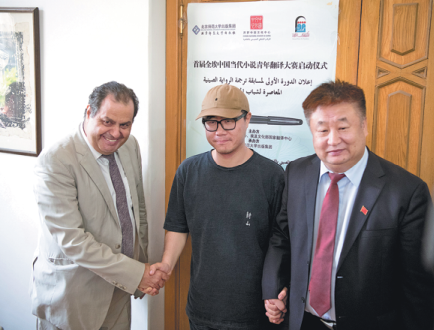CAIRO-Egypt's National Center for Translation has been focusing on translating Chinese books into Arabic to help Egyptian and Arab readers better understand China amid the Asian country's growing global influence, according to the organization's chief.
NCT director Anwar Mogheith says Arabs used to gain their knowledge of China through reading Chinese books translated into Arabic from intermediary languages like English, French and German.
"We faced the problem of a scarcity of Chinese books directly translated into Arabic, despite China's cultural influence in all fields including arts, literature, poetry, science, industry, development and others," Mogheith explains.
To overcome the shortage, the NCT has, so far, translated more than 30 books-covering all fields of knowledge-directly from Chinese into Arabic.
"We also have about five or six translated Chinese books currently under print, and we have contracts for another 10 Chinese books to be translated soon," Mogheith says, adding that the center is planning to translate 20 Chinese books every year.
Established in 2006, the NCT is a nonprofit institution that belongs to the Egyptian Ministry of Culture.
Mogheith says the number of books that the NCT translates is often based on the global cultural weight of their nation of origin.
He laments that the available Arabic versions of Chinese philosopher Lao Tzu's Book of the Way and Virtue, for instance, are translated from German and English editions.
"So, we planned to give priority to Chinese books in our recommendation list and focus on translating them directly from Chinese to Arabic. For example, if we have to translate just one of three foreign books, one of which is Chinese, that is the one we will choose to translate," he says.
Mogheith, also a philosophy professor at Egypt's Helwan University, points out that the center does not only translate Chinese books on economy and development, but also books on Chinese poetry and literature, in order to help Arab readers learn more about China's culture, its people and their values.
He adds that the NCT cares about translating more Chinese literature because there is a high demand among Arab readers.
"We translated the Chinese novel Red Sorghum before its author Mo Yan won the Nobel Prize in literature. So, we know very well how significant the Chinese works we translate into Arabic are," he says.
Chinese books already translated into Arabic by the NCT include, The History of Development of Chinese Thought, Chinese Transformative Industries, The Development of Small and Medium-Sized Enterprises, as well as Selection of Tang Dynasty Poetry.
The NCT also cooperates with the Cairo branch of Wisdom House for Cultural Industries, a Chinese-Egyptian company whose activities include publishing translated books from Chinese into Arabic and vice versa.
"The NCT has signed a protocol with Wisdom House to translate the three-volume book History of Chinese Literature. We welcome cooperation with Wisdom House and any other publishing house that would like to translate Chinese books into Arabic," Mogheith says.
The NCT doesn't just translate books, it also holds symposiums to discuss their content by gathering authors, translators and readers together.
The NCT also holds training courses for its translators to make sure their translations are professional.
In mid-June, in cooperation with the Chinese Cultural Center in Cairo, the NCT launched a competition for junior translators to not just provide an opportunity to gain further experience, but also to reward the most talented among them.
Mogheith says the NCT and the CCC have agreed to hold the translation race annually in a bid to increase the number of Chinese books translated into Arabic, while at the same time training more professional Chinese-Arabic translators.

